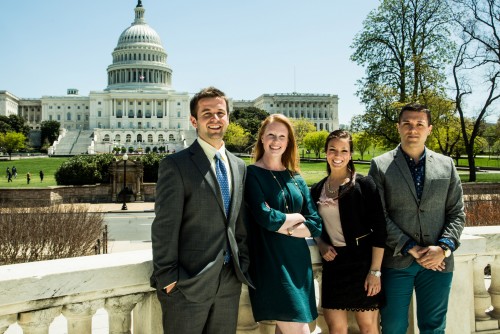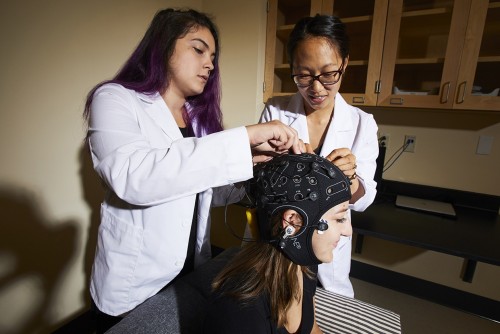Probing the Intersection of Democracies and Corruption
Student researchers examine the theory and practice of democracy with an eye toward factors that fuel corruption.
The flaws of democracy have certainly fueled many conversations. But two Stonehill undergraduates had the opportunity to dig a little deeper. This summer, they conducted graduate-level research into what makes democracies healthy and the roots of corruption.
Seniors Jacqueline Davis of Walpole and Victoria Hassan of Brockton partnered with Professor Kirk Buckman of the Department of Political Science & International Studies as part of the Stonehill Undergraduate Research Experience (SURE) program, which is an opportunity for students who have completed their first year at Stonehill to perform significant, publishable research with field experts in all disciplines.
“SURE is such a unique experience that makes Stonehill stand out,” says Davis. “As a paid research project, SURE has allowed students like me who cannot afford to spend all summer doing an unpaid internship get the valuable experience they might otherwise miss.”
Their project had three elements: a collective essay titled “Democracy and Corruption: A Tragedy of the Commons” and two separate and more complex research endeavors. Davis conducted a case study on political parties, corruption and democratic consolidation in Brazil, while Hassan developed a literature review of current theories of democratic consolidation
Jacqueline Davis and Victoria Hassan discuss their SURE project with Kirk Buckman, professor of Political Science & International Studies
“I argue that while party system development plays a crucial role in democratic consolidation, a normative shift must also occur that creates opposition against corruption,” says Davis of her research.
“Political corruption is very present throughout the world,” says Hassan, who studied democratic consolidation and corruption within democratic systems. “I think it’s something people should be educated about … in order to make a change.”
Their collective essay was built around previous research on how self-interest often threatens systems based on common good. “Understanding the factors that influence healthy democrac[ies] and limit corruption are beneficial both to the standard of living in countries that still struggle and to the global community in general,” Davis says.
Davis’ and Hassan’s ultimate goal is to present a paper next year at the International Studies Association Northeast Annual Conference, an interdisciplinary regional conference of scholars engaged in international scholarship.
“It provides a powerful opportunity for the students to present scholarship in a public forum and to receive critical feedback from professionals working in the same area,” says Buckman. “It’s a very powerful learning experience that helps the students mature intellectually and professionally.”
SURE research and subsequent conference participation often broaden students’ thoughts about their lives after Stonehill.
“It helps the students mature as scholars and prepares them to conduct and present research in professional settings,” Buckman says. “I love SURE because it affords me the opportunity to work with students on research projects and helps them mature intellectually as scholars.”
A political science major and environmental studies minor, Hassan says she’s now considering grad school more seriously after her SURE summer.
“The goal is obviously to conduct research, but the greatest reward and most powerful outcome is the mentoring and personal commitment the faculty make to help the student learn and mature as a scholar and professional,” Buckman concludes.


